Ever feel lost in a sea of resumes when searching for your next top manager?
You’re not alone.
Resumes and interviews can offer a glimpse into a candidate’s experience, but what if there was a way to truly assess their leadership potential and core managerial skills?
Enter management assessment tests.
These powerful tools go beyond the surface by providing a data-driven picture of a candidate’s capabilities in critical areas like decision-making and team leadership.
This blog post examines management assessment tests in depth to equip you with the insights needed to find and nurture top managerial talent.
What Is a Management Assessment Test?
A management assessment test evaluates the capabilities and potential of managerial candidates using various tools, including online tests, personality inventories, and situational judgment tasks.
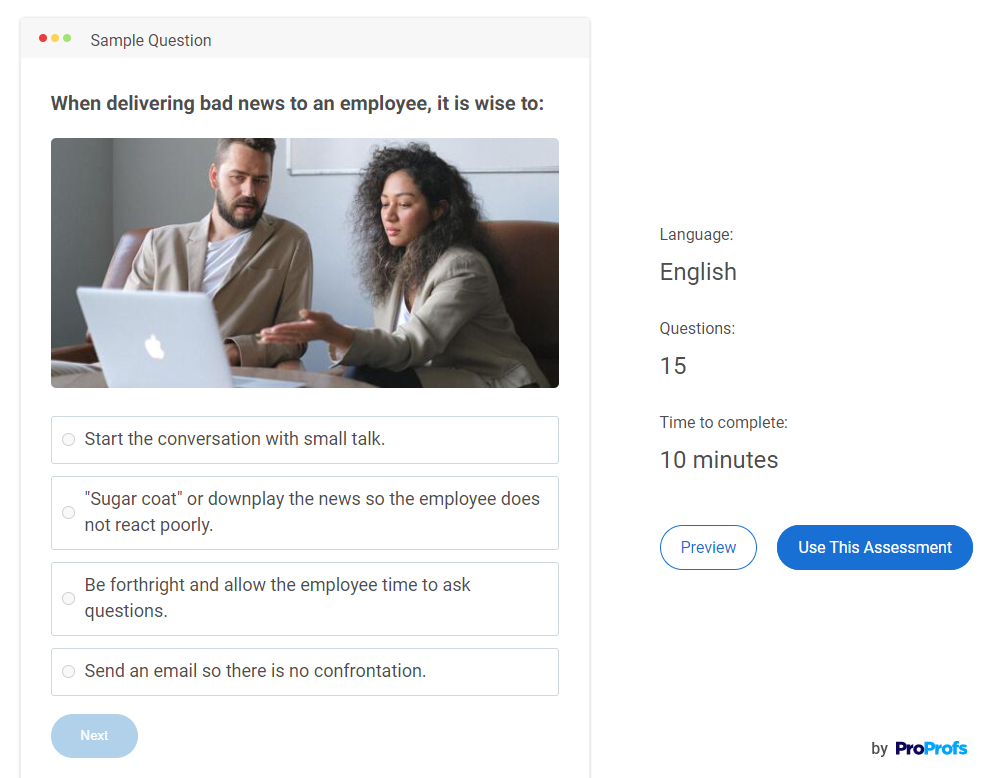
Management skills and psychometric assessments measure crucial leadership skills such as strategic planning, decision-making, and communication. They help ensure that managerial roles are filled by individuals who align well with an organization’s strategic goals and culture, enhancing the accuracy of hiring and promotion decisions.
Watch: How to Create an Online Assessment
Why Should Organizations Use Management Assessment Tests?
Your management’s caliber directly influences your company’s trajectory. Management assessment tests serve as essential tools in identifying and confirming prospective and current managers’ aptitude and suitability.
Here are some compelling reasons to integrate these assessments into your hiring and development strategies:
- Objective Insights: Selection biases can cloud judgment during hiring and promotion processes. Management assessment tests offer a systematic approach to evaluating a candidate’s skills, providing clear, unbiased insights.
- Uncovering Potential: These tests go beyond current capabilities to assess a candidate’s capacity for growth and advancement. This foresight is vital for nurturing a robust pipeline of leadership talent, ensuring your organization is well-prepared for future challenges.
- Improving Team Dynamics: A manager’s impact extends across their entire team, influencing work culture and productivity. Assessing candidates for their interpersonal skills and leadership approach helps secure a harmonious fit, fostering a more collaborative and effective team environment.
- Minimizing Costly Missteps: Misjudgments in managerial appointments can lead to increased turnover and wasted resources. Management assessment tests mitigate these risks by confirming candidate suitability before job offers are extended, thus stabilizing team performance and morale.
- Targeted Development: By pinpointing strengths and areas for improvement, these tests allow for customized development plans, enhancing managerial skills in a way that aligns with organizational needs and maximizes training outcomes.
Related Read: How to Conduct a Training Needs Assessment in Your Organization
Incorporating management assessment tests into your organizational practices not only sharpens your hiring and promotion decisions but also strengthens your management team’s overall effectiveness.
The following sections explore the key skills these tests evaluate and guide you on deploying them to fortify your leadership framework.
What Skills Do Managers Require?
Management assessment tests evaluate a range of competencies that are essential for effective leadership. Here are some of the key skills these assessments focus on:
- Communication Skills
Clear and effective communication is the foundation of successful management. These skills enable managers to convey ideas, expectations, and feedback in a way that is understandable and actionable for their teams.
Communication skills assessments can evaluate how well a candidate articulates thoughts, listens to others, and uses communication to influence and lead. They can also provide managers with valuable insights into their communication strengths and areas for improvement.
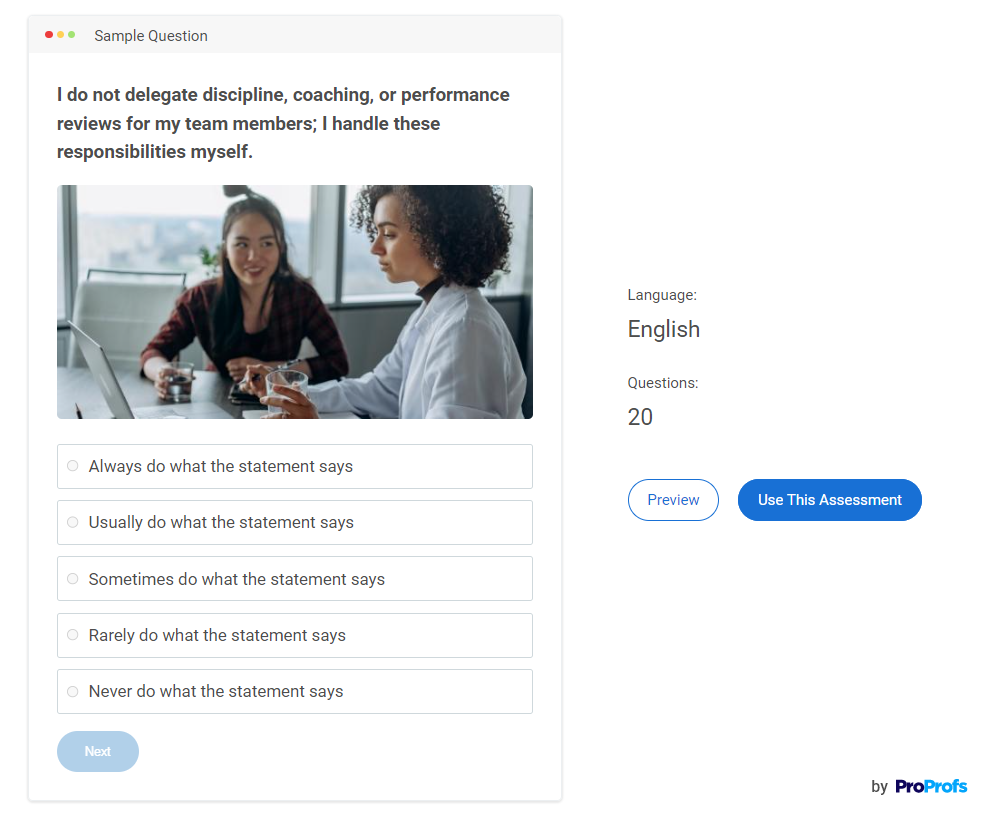
- Problem-Solving
Every manager will face unexpected challenges; their ability to identify problems, analyze information, and propose viable solutions is critical. Management tests often include scenarios that require candidates to demonstrate how they approach and resolve complex issues.
- Leadership Skills
True leaders inspire and motivate their teams to achieve higher performance and engagement. Assessments measure a candidate’s ability to lead by example, set strategic directions, and drive their team toward common goals.
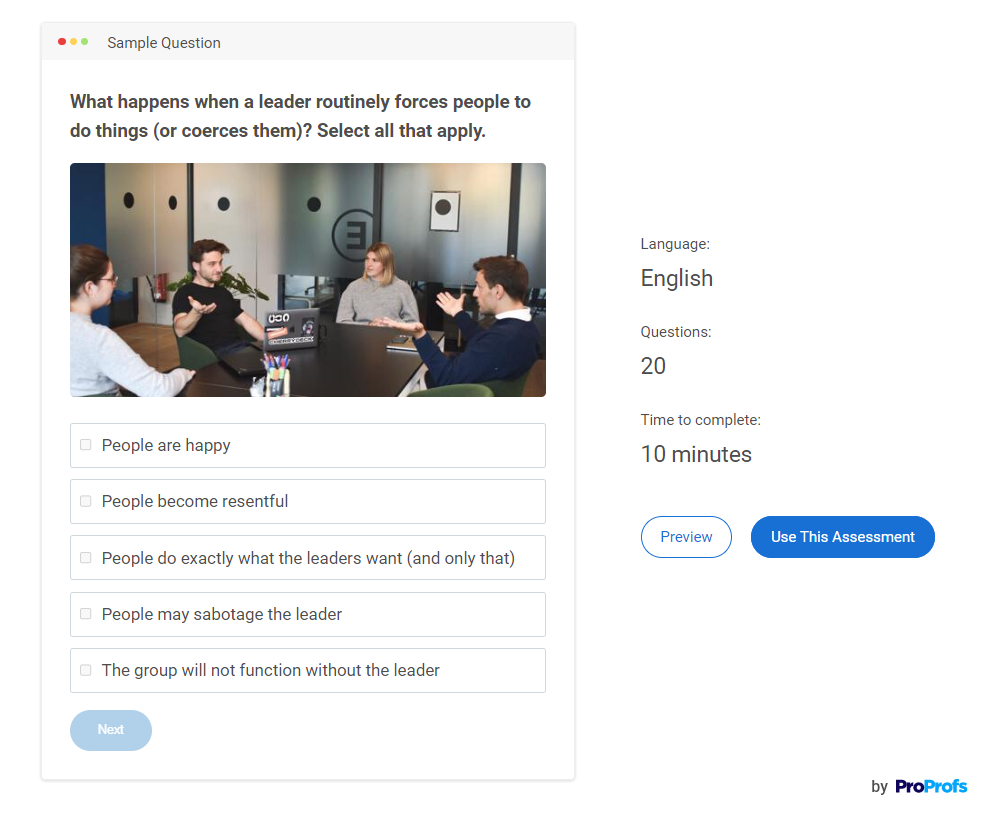
- Delegation
Effective delegation is not just about assigning tasks; it’s about choosing the right tasks for the right people. This skill ensures that tasks are completed efficiently while developing employees’ skills and preparing them for more responsibilities.
- Empathy
Understanding and relating to the emotions of others is vital for managing a harmonious workplace. Empathy in management helps address employee concerns, foster a supportive work environment, and enhance team collaboration.
- Cultural Competence
In today’s global market, managers must be able to navigate and respect diverse cultural practices and values. This competence helps in managing international teams effectively and ensures inclusive workplace practices.
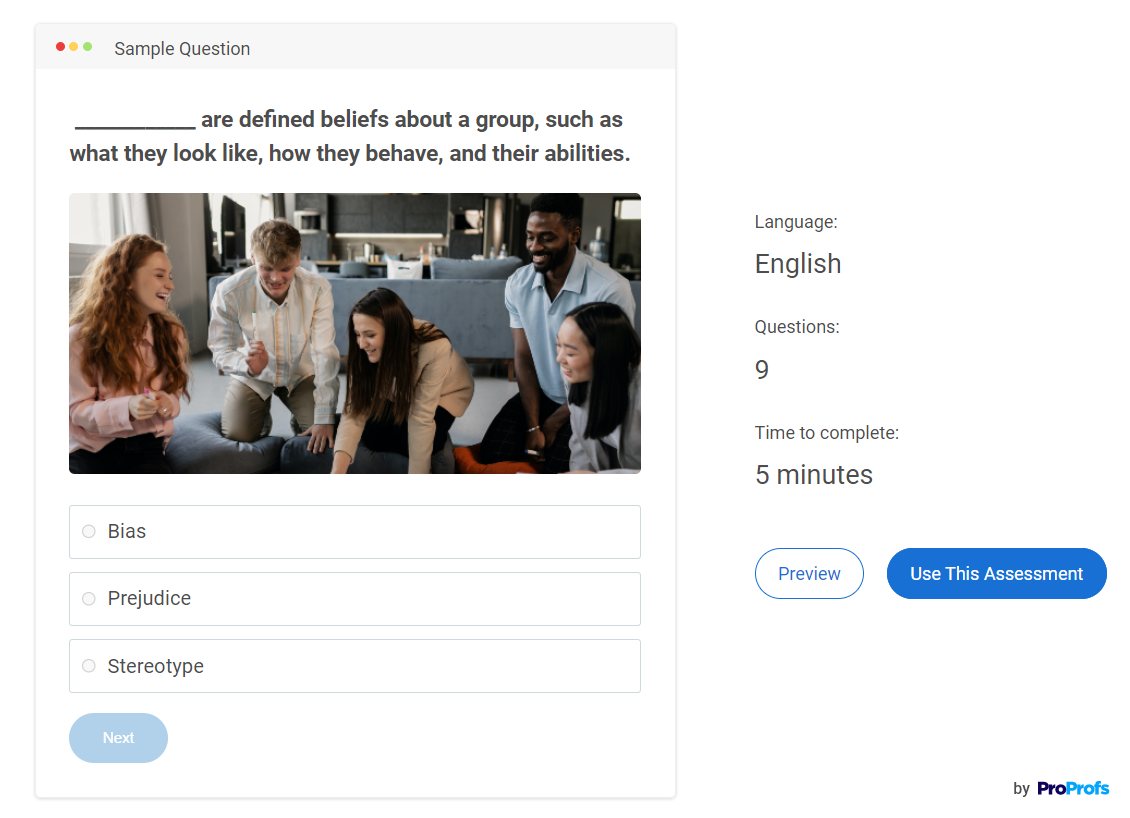
- Strategic Thinking
Managers must be able to see the big picture and plan for the future. This skill involves setting long-term goals and aligning daily operations with broader organizational objectives.
- Financial Acumen
Managers often oversee budgets and need to understand financial metrics to make informed decisions that will affect the profitability and financial health of the organization.
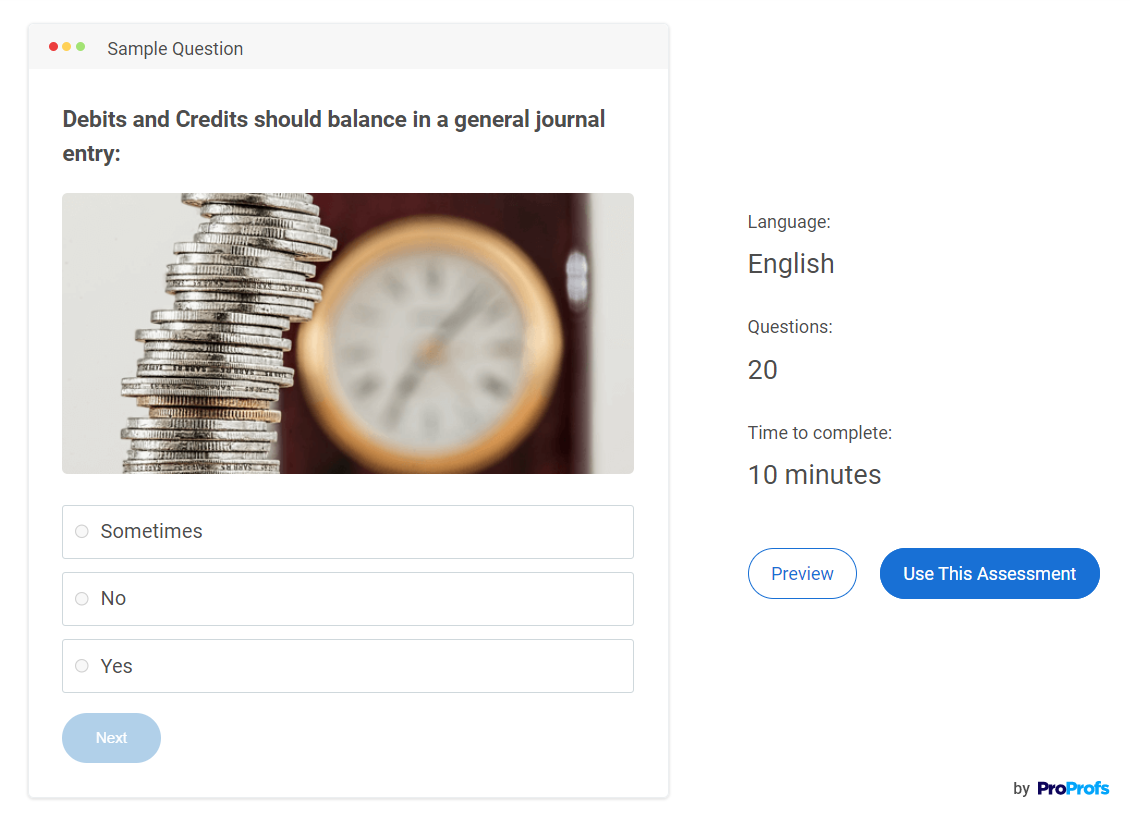
- Change Management
Effective change management is an essential skill for managers navigating teams through organizational transitions. By implementing strategic adjustments to structures, processes, or strategies, managers empower their teams to embrace these changes smoothly. This proactive approach ensures continued focus and sustained performance even during potentially disruptive periods.
- Adaptability
The ability to quickly adjust to new conditions and overcome challenges is essential for managers. Adaptability ensures they can respond effectively to changing market conditions, technological advancements, and evolving team dynamics.
How to Use a Management Assessment Test
Implementing a management assessment test is a strategic approach that can significantly improve your hiring and development processes.
Here’s an in-depth look at how to leverage these tests:
- Determine Your Company’s Needs
Start by identifying the skills and attributes that are critical for success in your managerial roles. Consider factors such as industry, company culture, team structure and the specific challenges your managers will face.
For example, in a fast-paced startup environment, agility and the ability to think on one’s feet might be prioritized, whereas, in a large, established corporation, emphasis might be on strategic planning and leadership stability.
- Carry Out a Thorough Job Analysis
This involves a detailed examination of the role and its context. Determine the manager’s daily responsibilities, the challenges they will face, and the goals they are expected to meet.
This step should inform which competencies are most relevant for assessment. For instance, if the role involves a high degree of conflict resolution, you’ll want to assess candidates’ abilities in mediation and emotional intelligence.
- Draft a Stellar Job Description
Armed with the insights from your job analysis, create a job description that not only attracts candidates but also serves as a yardstick for assessment. The description should clearly outline the required skills and expected outcomes, helping to ensure that it resonates with the right candidates.
For example, if the role requires leading diverse teams, mention the need for proven experience in managing multicultural environments.
- Administer the Management Assessment Test
Select and administer a test tailored to the key competencies identified earlier. Ensure the test environment is controlled to maintain consistency.
Consider the format—whether online or in-person—and ensure that it aligns with the test’s objectives. For example, to assess communication skills, you might include a video-based scenario requiring the candidate to respond to an upset client or a disengaged team.
Watch: How to Handle Difficult Employees | Training Course Introduction
- Conduct Interviews
Use the management assessment test results to structure your interview questions. This allows you to explore areas where candidates showed particular strengths or weaknesses in the test.
Tailor your questions to explore how their skills have been applied in past roles and how they approach real-world problems.

- Make Your Decision and Proceed to Onboarding
Combine the data from the assessment tests and interviews to make a well-informed hiring decision. Evaluate candidates based on their current capabilities as well as potential to grow within the company.
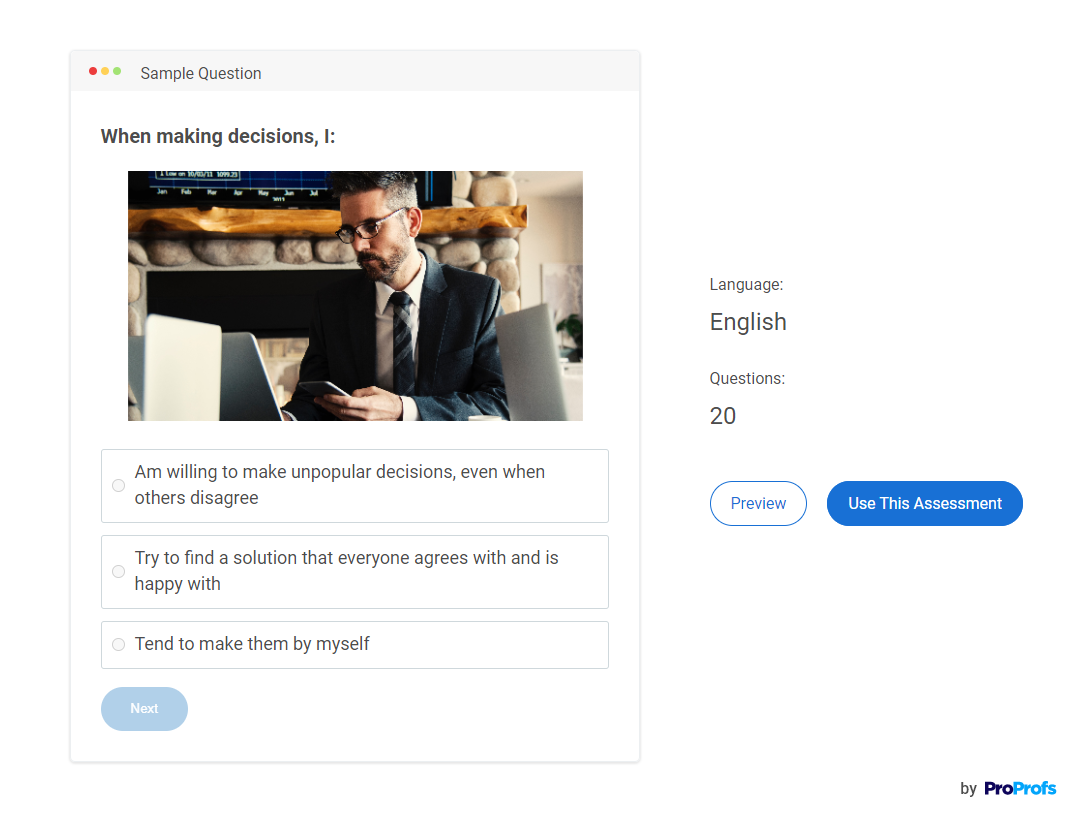
Read: What are Hiring Assessment Tools & How to Pick a Suitable Option?
Once a decision is made, facilitate a comprehensive onboarding process that helps the new manager assimilate into their role and the company culture, setting them up for success from the start.
Watch: How to Create an Employee Onboarding Training Program
By thoroughly integrating management assessment tests into your hiring and development strategies, you can enhance your ability to identify and nurture effective managerial talent, directly contributing to your organization’s success.
FREE. All Features. FOREVER!
Try our Forever FREE account with all premium features!
Types and Examples of Management Assessment Tests
Below are some common management assessment tools, accompanied by examples to illustrate how they might be used to evaluate various aspects of a management candidate’s suitability.
- Cognitive Ability Tests
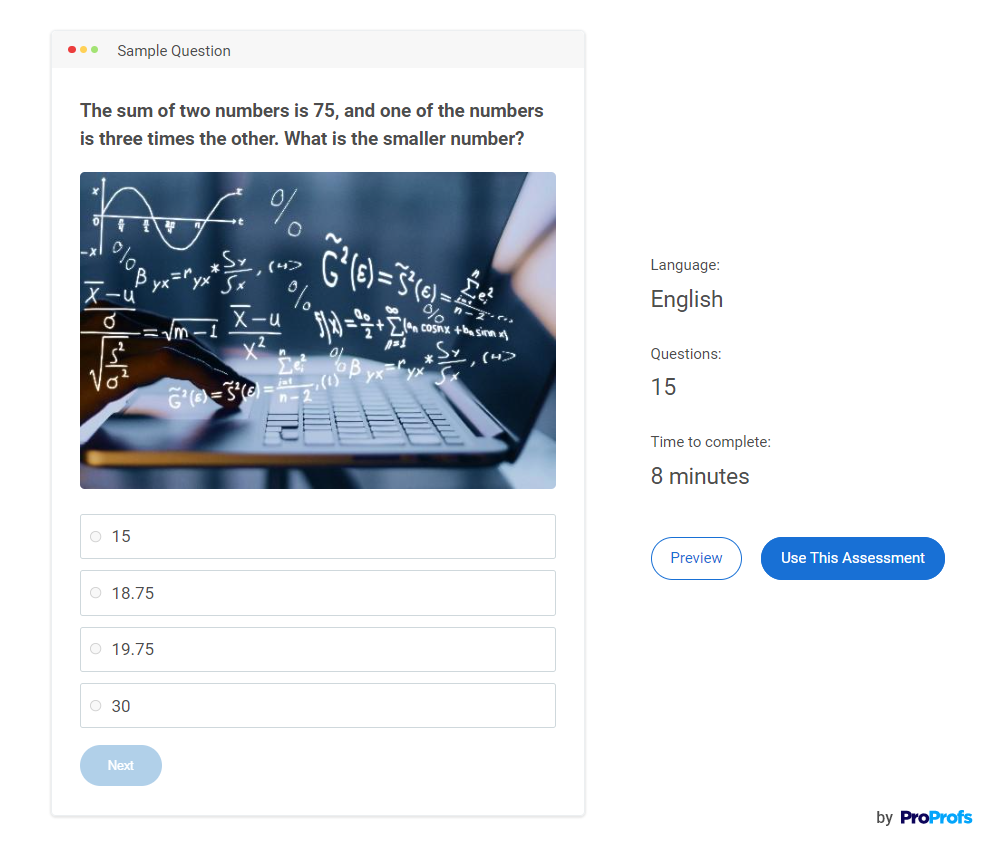
Cognitive tests measure a candidate’s ability to think critically, solve problems, and process information quickly. They are essential for assessing a manager’s capacity to handle complex decision-making and strategic planning.
- Example: A test might include a series of logical reasoning puzzles or numerical problem-solving exercises to evaluate analytical skills.
Related Read: The Power of Cognitive Assessment Tests in Recruiting Talent
- Personality Assessments
Personality tests gauge behavioral styles and temperaments, which are crucial for predicting how candidates will interact with teams and fit into company culture.
- Example: A version of the Big Five personality test that evaluates traits such as openness, conscientiousness, extraversion, agreeableness, and neuroticism.
Related Read: How to Create the Perfect Personality Quiz
Watch: How to Create a Personality Quiz
- Situational Judgment Tests (SJTs)
SJTs present hypothetical, job-related scenarios, assessing a candidate’s judgment and problem-solving in specific contexts.
- Example: A scenario where the candidate must choose the best response to resolving a conflict between two team members.
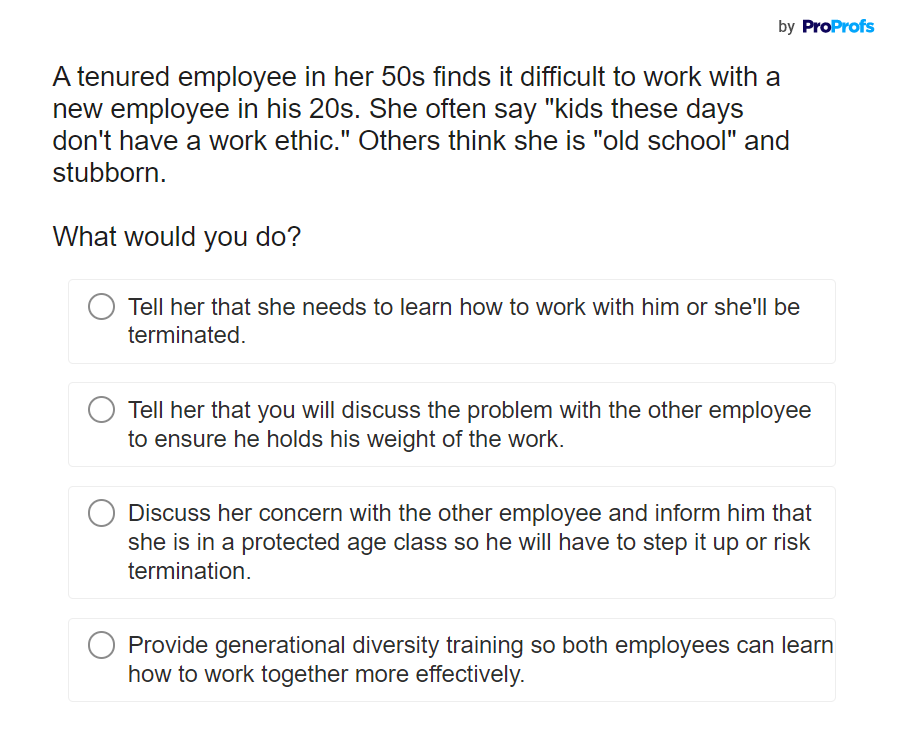
- Skill Assessment Tests
These are tailored to assess specific managerial skills relevant to the job, such as project management, budgeting, and leadership.
- Example: A project management simulation that requires candidates to plan, execute, and review a project using limited resources or an online quiz that tests candidates’ knowledge.
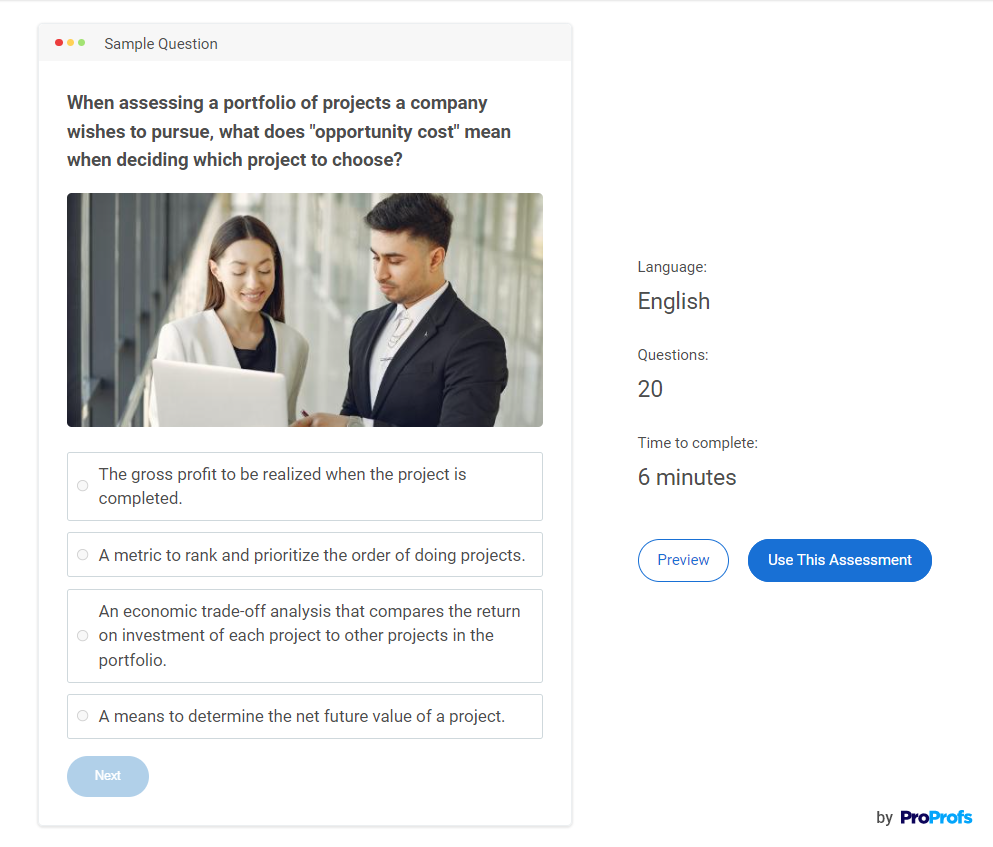
- 360-Degree Feedback Assessments
This holistic approach involves feedback from a range of individuals within the company, including peers, subordinates, and superiors, providing a comprehensive view of a candidate’s leadership effectiveness.
- Example: Collecting and analyzing feedback on a candidate’s leadership style and effectiveness from multiple team members through a structured supervisor evaluation survey.
Watch: How to Create an Online Survey
- Emotional Intelligence (EI) Tests
EI tests measure a candidate’s ability to understand and manage their emotions and those of others, a key skill for effective leadership.
- Example: A questionnaire that assesses how candidates perceive and react to their emotions and those of others in various work-related situations.
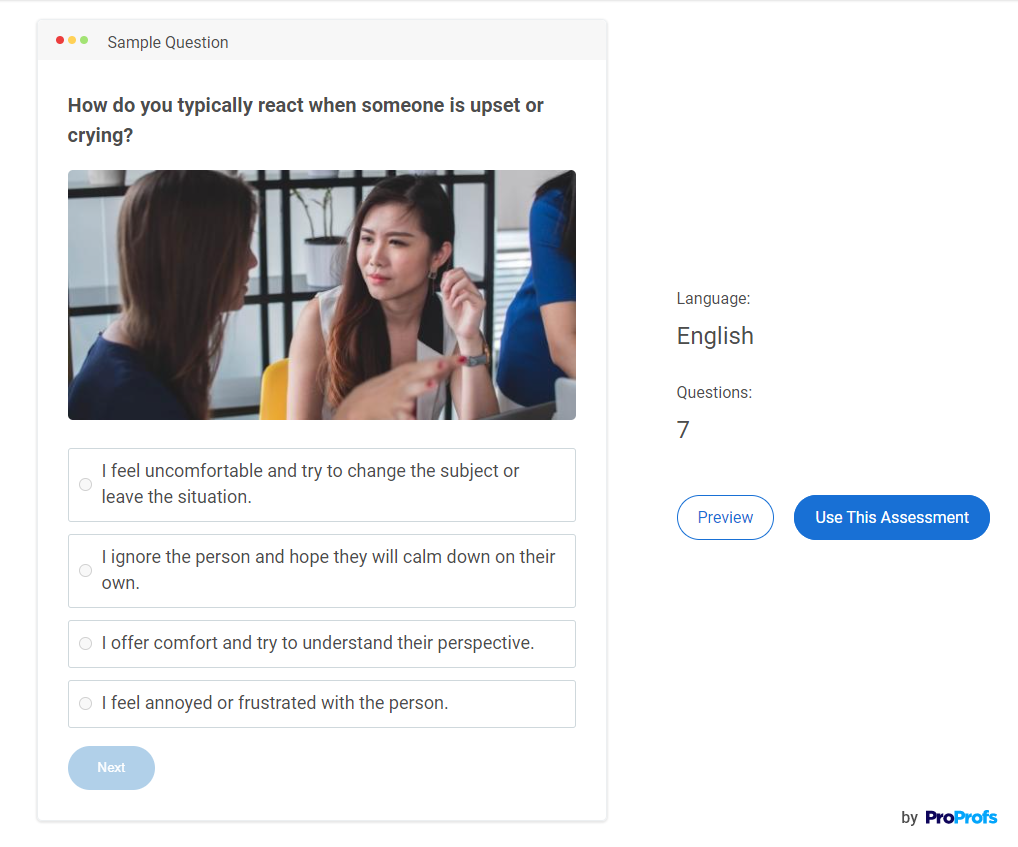
- Case Study Exercises
These exercises simulate real-world challenges that managers might face, requiring them to demonstrate their analytical, strategic, and decision-making skills.
- Example: A business case study involving a declining market scenario where the candidate must devise a sales management strategy to recover sales and present their solution.
By using these varied assessment tools, organizations can make well-informed decisions about managerial candidates and ensure they select leaders who align with their operational and cultural needs.
How to Create Management Assessment Quizzes
Creating a management assessment test can significantly streamline the process of evaluating potential managers.
ProProfs Quiz Maker is a powerful tool that simplifies this process, allowing you to effectively assess the knowledge, skills, and personality traits of candidates.
Here’s a guide on how to use it for creating management assessment tests:
Step 1: Choose the Type of Quiz
Decide if you need a scored quiz to evaluate knowledge and skills or a personality quiz to understand behavioral traits. For management roles, you might often combine both to get a comprehensive view of the candidate’s capabilities and fit.
- Scored quizzes are ideal for testing managerial skills like strategic thinking and decision-making.
- Personality quizzes help analyze traits such as leadership style and empathy.
Step 2: Pick a Quiz Creation Method
ProProfs Quiz Maker offers flexible options for creating assessment quizzes. You can:
- Customize a pre-existing quiz from ProProfs’ extensive library, tailored specifically for management assessments.
- Generate a quiz quickly using ProProfs AI quiz maker based on the competencies you wish to assess.
- Build a quiz from scratch if you have specific requirements or want to include unique scenarios relevant to your organization.
Step 3: Design the Quiz Cover
Craft an engaging start to your quiz by designing an appealing cover:
- Add a quiz title that clearly indicates the purpose, such as “Management Skills Assessment.”
- Use a cover image or video that aligns with your company’s branding and introduces the assessment succinctly.
- Include a brief description that outlines the quiz’s purpose, question format, expected duration, and how the results will be utilized, setting clear expectations for participants.
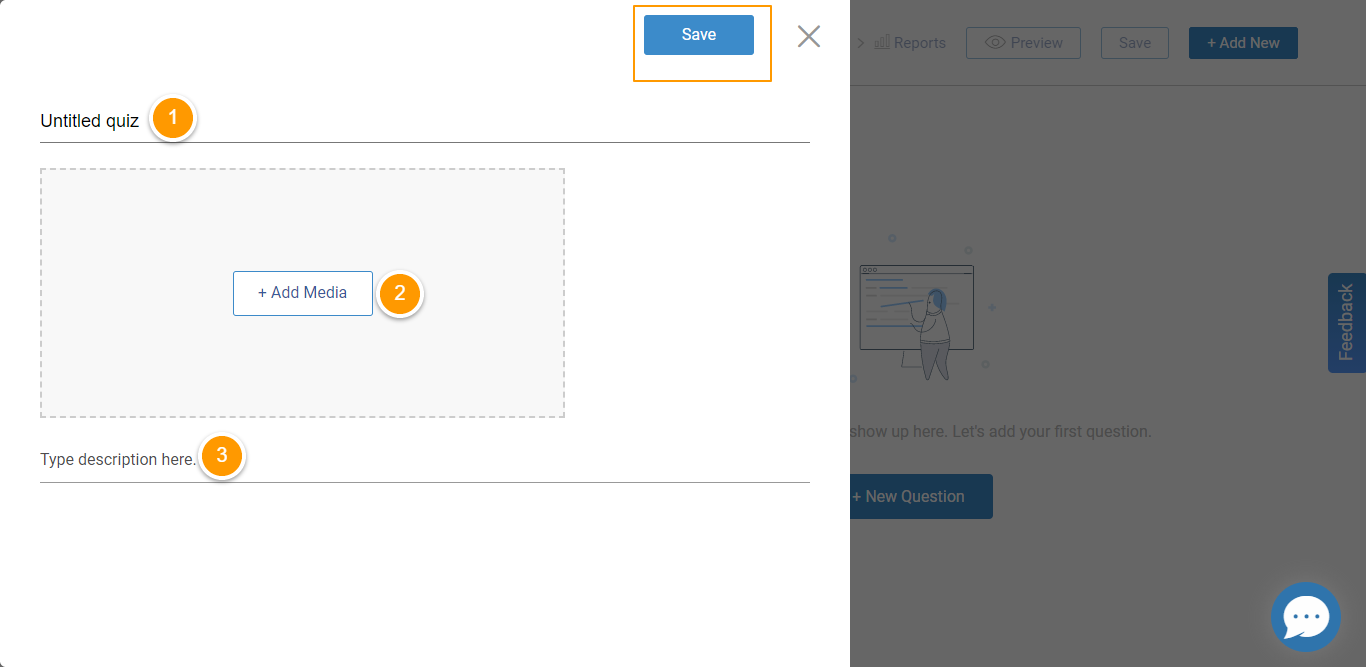
Step 4: Add/Edit Questions and Media
Develop questions that reflect real-world management challenges to assess candidates effectively:
- Choose from over 15 different question types to make the quiz dynamic and engaging.
- Incorporate multimedia elements like images, videos, and documents to simulate real-life scenarios managers might encounter.
- Use ProProfs AI or import questions from a question bank to save time and ensure quality.
Watch: 15+ Question Types for Online Assessment
Step 5: Automate Grading and Configure Outcomes
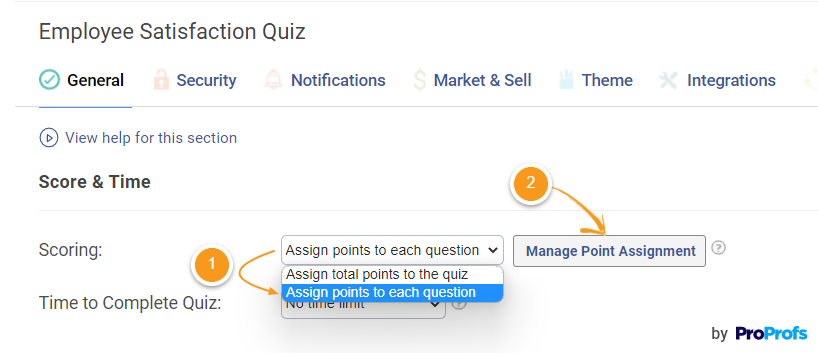
Set up automated grading for objective questions to streamline the assessment process:
- Apply different grading scales, including partial or custom grading, to evaluate answers more effectively.
- For personality quizzes, link answers to specific managerial personality types to help identify the best fit for your organization.
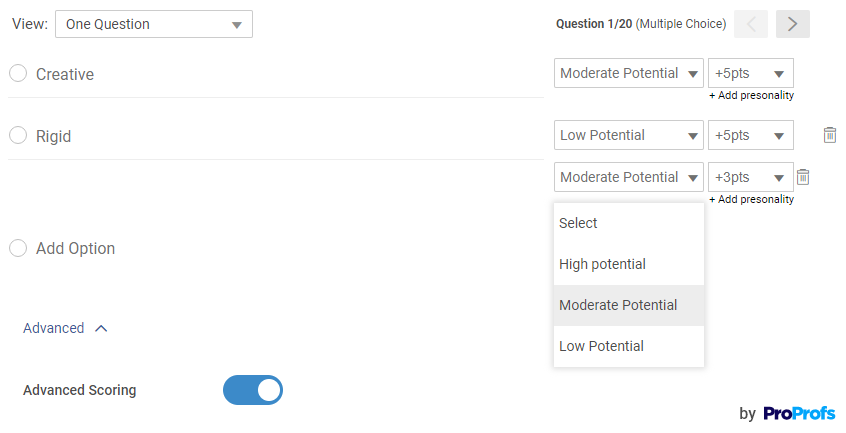
Step 6: Configure Settings and Customize the Theme
Adjust quiz settings to meet your specific assessment needs:
- Implement anti-cheating measures like proctoring and question shuffling.
- Set time limits and control what feedback or results candidates see post-assessment.
- Customize the quiz’s appearance with your company’s branding to create a professional and cohesive experience.
Watch: How to Customize & Configure Your Quiz Settings
And that’s it. Your management assessment test is ready to deploy.
Optimize Leadership With Management Assessment Tests
Implementing management assessment tests is a strategic investment in your organization’s future leadership. These tests deliver crucial insights into the skills and potential of candidates, ensuring the right fit for managerial roles.
ProProfs Quiz Maker enhances this process with features like 15+ question types, robust security and proctoring settings, in-depth reporting, AI quiz generation, and ready-to-use management assessments designed by experts.
By regularly refining your strategies with these tools, you ensure your leadership pipeline is both robust and aligned with evolving business goals. ProProfs Quiz Maker empowers you to efficiently cultivate and deploy future leaders, securing your organization’s progress.

 We'd love your feedback!
We'd love your feedback! Thanks for your feedback!
Thanks for your feedback!







